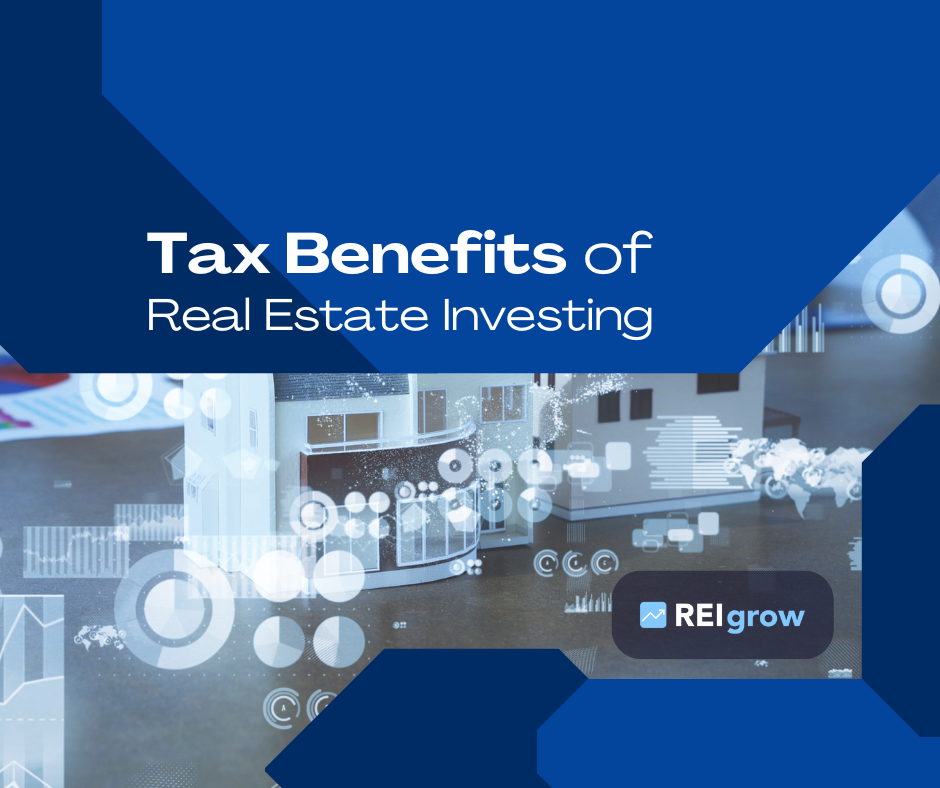Tax Benefits of Real Estate Investing: Tax Breaks & Deductions
Investing in real estate might seem overwhelming.
But, the tax benefits of real estate investing can make a big difference in the long run.
Real estate investors can avail of numerous tax breaks and deductions to lower their taxable income and grow their wealth.
Here in this post, we will shed light on the tax perks and deductions that can shape your financial plan.
1. Real Estate Tax Write-Offs
Real estate investors can avail of different types of real estate tax write-offs, such as:
- Spread out the cost of the property over its useful life to lower taxable income each year.
- Deduct the interest paid on your mortgage to reduce taxable income.
- Write off property taxes to further lower your tax bill.
- Deduct expenses for maintaining the property to reduce tax liability.
- Explore the option of 1031 exchanges to defer capital gains taxes when selling one investment property and purchasing another.
- Deduct expenses for repairs and maintenance on your real estate investments, as these costs can often be tax-deductible.
- If you have rental properties that generate a loss, you may be able to offset other income through passive activity loss rules.
Be sure to maintain records of all expenses related to your real estate investments, including mortgage interest payments and property taxes.
Consult a tax professional to ensure you’re maximizing tax benefits and taking advantage of all available investment property tax deductions.
2. Depreciation
Depreciation allows you to deduct the costs of buying and improving a rental property over its useful life.
You can calculate depreciation by subtracting the land value from the property’s overall value and dividing it by the IRS-designated recovery period.
Maintain detailed records of the property’s purchase price, improvements, and any other relevant expenses for accurate calculation of depreciation.
Investors utilize the depreciation deduction to lower taxable income and potentially save on taxes.
You can spread out this deduction over several years to lower your taxable income each year. This strategy can result in substantial tax savings.
Stay updated on tax laws and regulations related to investment property tax depreciations to maximize its benefits for your real estate investments.
3. Capital Gains on Real Estate Investments
Short-term capital gains are profits earned from real estate investments held for less than a year.
This type of capital gains on real estate investments are taxed at higher rates than long-term capital gains.
Carefully evaluate your investment horizon and liquidity needs before you opt for short-term gains.
Keep track of the holding period for each property to make informed decisions on when to sell.
Therefore, timing your investments according to a pre-determined strategy can make a big difference in what you owe.
4. Pass-through Deduction
Familiarize yourself with the requirements for qualifying for the pass-through deduction.
Factors such as the type of real estate activity, taxable income, and business structure can impact your eligibility. You could deduct up to 20% of your qualified business income from your taxable income.
Consider the most tax-efficient business structure for your real estate investments.
Depending on your circumstances, operating as a partnership, LLC, or S corporation could enhance your eligibility for the pass-through deduction.
The pass-through deduction can be intricate due to its various rules and calculations. Therefore, consulting an experienced tax professional is advisable to ensure you benefit from this perk.
5. Incentive Programs
Incentive programs like the 1031 Exchange and Opportunity Zones can significantly impact the tax benefits available to real estate investors.
These programs offer unique opportunities for investors to defer or reduce taxes.
Real Estate Tax Benefits via 1031 Exchange
Utilizing a 1031 Exchange program can be a strategic move for real estate investors keen to optimize their investment portfolio and maximize tax advantages.
Investors can:
- Postpone taxes on capital gains by reinvesting in a similar property.
- Acquire a property with better income potential while deferring taxes.
- Spread the risk by diversifying into different types of real estate investments.
- Compound wealth by reinvesting gains without immediate tax consequences.
Opportunity Zones
Opportunity Zones refer to designated geographical areas where the government offers numerous tax incentives to investors.
Before buying property in an opportunity zone, real estate investors should typically plan for a minimum holding period of at least ten years to fully benefit from tax incentives and maximize returns.
6. Self-employment without the FICA Tax
Investors can bypass the FICA tax burden by structuring real estate investment activities. You can unlock various tax benefits that can optimize your financial position.
- Self-Employment Tax Deductions: Lower your overall tax liability by deducting business expenses related to your real estate investment activities.
- Control Over Tax Planning: Tailor strategic tax planning opportunities to maximize benefits for your real estate investment business.
- Tax-Advantaged Retirement Accounts: Explore options such as a Solo 401(k) or a SEP IRA to save for retirement while reducing your taxable income.
- Forming an S Corporation: Allocate income as distributions instead of salary to avoid FICA taxes.
- Utilizing a Limited Liability Company (LLC): Structure earnings as profits rather than wages to reduce FICA tax liability.
- Taking Advantage of Qualified Business Income Deduction: Lower taxable income, subject to FICA taxes through this deduction.
- Employing Spouse or Family Members: Split income by hiring family members to reduce FICA tax obligations.
7. Other Ways to Lower Your Tax Bill
Looking for more ways to reduce your tax bill?
Opening an IRA or contributing to a 401(k) can help lower your taxable income and grow your retirement savings.
Considering asset location strategies can also optimize your investments for tax efficiency.
Why Open an IRA?
- Tax-deferred Growth: Investments in an IRA grow tax-deferred, allowing your money to compound over time without being taxed annually.
- Potential Tax Deductions: Depending on the type of IRA you choose, you may be eligible for tax deductions on your contributions, reducing your taxable income.
- Early Withdrawal Penalties: Be cautious of any penalties for early withdrawals before retirement age to avoid unnecessary taxes and fees.
Contribute to a 401(k)
- Lower Your Taxable Income: Reduce the taxable income by contributing to a 401(k) account.
- Tax-Deferred Growth: Your contributions grow tax-deferred until withdrawal in retirement, potentially in a lower tax bracket.
- Employer Matching Contributions: Take advantage of free money towards your retirement savings with employer matches.
Consider Asset Location
It is a strategic approach to minimize your tax bill effectively when investing in real estate. Here’s a checklist to help you utilize asset location to your advantage:
- Tax Efficiency: Place tax-inefficient investments in tax-advantaged accounts to minimize the tax impact on your overall portfolio.
- Capital Gains Management: Optimize your tax burden by holding assets in locations that offer favorable capital gains tax rates.
- Income Distribution: Reduce taxes on income-generating assets by allocating them to tax-favorable locations.
Frequently Asked Questions
Can I Use Real Estate Tax Write-Offs for Both Personal and Investment Properties?
Yes. You can use real estate tax write-offs for both personal and investment properties.
However, you must understand the specifics of each write-off and ensure you meet the requirements to maximize your benefits.
How Does Depreciation of Real Estate Assets Affect My Overall Tax Liability?
Depreciation of real estate assets can lower your taxable income, potentially reducing your overall tax liability.
You can offset rental income by deducting depreciation expenses, thus decreasing the amount of taxes you owe.
What Are the Specific Criteria for Qualifying for the Pass-Through Deduction as a Real Estate Investor?
To qualify for the pass-through deduction as a real estate investor, you must meet criteria like being in a qualified trade or business and ensuring your taxable income falls within specific thresholds. Consult with a tax professional for personalized advice.







